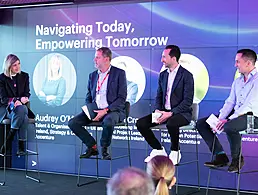What do you need to know to best prepare for re-entry into the workforce?
People leave the workforce for any number of reasons, such as ill health, new financial circumstances or changing priorities. If they decide to return to work, it can be a daunting experience as time away, even briefly, can often make you feel as though you are out of the loop and catching up is an impossibility.
While those feelings are valid and will take time to overcome, restarting your career is also a time of great excitement and anticipation, as you are entering into the workforce likely far more skilled than you were the first time around, with the benefit of life experience.
So, as you embark upon the next phase of your professional life, what do you need to know about returnships?
What is a returnship?
Returnships are sometimes likened to internships, however, they are very different. While internships tend to attract college graduates and early-career starters, returnships are return-to-work programmes aimed at more experienced professionals who have returned from a career break.
While they will likely be more skilled than individuals undertaking an internship, career returners will probably also have to partake in upskilling or even reskilling as a means of assimilating into a workforce that has changed in their absence.
In many cases, in light of career history and level of experience, returnships also tend to be paid and can lead to part or full-time employment upon the completion of the programme.
What is involved?
Though it will depend on the organisation, returnship programmes tend to follow a standard formula that works to bridge the gap between current and returning employees through training, networking, work experience or placement and supportive feedback.
Structured itineraries allow returning workers to gradually ease their way back into their chosen industry, using the skills they already possess and learning all of the new elements, in a manner that makes the transition much easier than if they were to rejoin independently.
This can be especially useful for people who have been out of work since before technologies such as AI and ML began to rapidly automate workplace tasks.
How to apply
Different countries and their organisations are going to have their own rules for who can apply and how, however, there are a number of ways in which you can best position yourself to be accepted.
For the most part, employers keep interview questions professional, however, if your reason for taking an extended break is personal in nature and in your opinion not information you are eager to share, be prepared to deflect.
Additionally, in advance of applying you should research the company and industry you are hoping to join, as even though you will not be expected to have a wealth of knowledge, you will likely still be expected to know something about the organisation, its goals and how it might benefit from having someone of your experience.
By defining your goals and outlining what you hope to achieve, you will show not only your personal commitment to progressing your career, but also your ambitions to be an active, contributing and valuable member of the organisation. Also, in lieu of technical ability you should highlight your soft skills, which are cross-functional and highly regarded in most, if not all, careers.
What are the benefits?
If you are still on the fence about whether or not you are ready to commit to a returnship programme, an understanding of the key benefits may help you make up your mind. The main advantage of course is that you gain paid employment in an industry of your choice without having to start at the lowest rung.
You have access to career guidance and support that can enable you to upskill and progress professionally, while also building a network, becoming a valued member of the team and taking part in work that means something to you.
Also, if you are in a minority group that is typically marginalised or overlooked from a professional point of view, you can improve your opportunities to get your foot in the door and actualise your ambitions.
Lastly, if you have been out of work for a prolonged period of time, you may have been missing workplace camaraderie and the structure of a workday. Returnships can give employees a sense of purpose and community.
At the end of the day, making that decision to return to work after a break away is a brave one and should be commended. The hard decisions have already been made, so why not take a deep breath and jump on in?
Don’t miss out on the knowledge you need to succeed. Sign up for the Daily Brief, Silicon Republic’s digest of need-to-know sci-tech news.




